Quartz kitchen countertops have become increasingly popular among homeowners and interior designers due to their durability, aesthetic appeal and low maintenance. The kitchen is often seen as the core of the home and its design significantly influences the overall ambiance of the entire living space. When it comes to countertops, quartz offers a perfect blend of beauty and functionality. Engineered from natural quartz crystals and resins, these surfaces are not only visually striking but also incredibly durable. This article aims to guide you through the various aspects of quartz countertops, from design choices to upkeep, ensuring your kitchen remains both stylish and practical.
See also: Granite vs. Quartz kitchen countertops: A buyer’s guide
Five stunning quartz kitchen countertops
Calacatta quartz
Calacatta quartz is renowned for its elegant white background and bold, dramatic veining. This countertop option mimics the appearance of luxurious Calacatta marble but offers the durability and ease of maintenance that quartz provides. Its striking design makes it a focal point in any kitchen, adding a touch of sophistication and timeless beauty.
Carrara quartz
For those seeking a more subtle and classic look, Carrara quartz is an excellent choice. It features a soft white or grey background with delicate, fine veining. Carrara quartz complements a wide range of kitchen styles, from traditional to contemporary, making it a versatile option for homeowners.
Stellar white quartz
Stellar White quartz is perfect for creating a bright and airy kitchen atmosphere. Its pure white surface with tiny reflective specks adds a touch of sparkle and elegance to the space. This countertop option pairs beautifully with both light and dark cabinetry, offering a clean and modern aesthetic.
Concrete-look quartz
If you prefer an industrial or urban chic vibe, concrete-look quartz is an excellent choice. This countertop mimics the appearance of raw concrete, complete with its textured surface and grey tones. It adds a contemporary edge to your kitchen while maintaining the benefits of quartz, such as stain resistance and durability.
Black quartz
For a bold and dramatic statement, black quartz countertops are a fantastic option. The deep, rich colour creates a sense of luxury and sophistication, making it a standout feature in any kitchen. Black quartz pairs exceptionally well with metallic accents and modern cabinetry, creating a sleek and stylish look.
Colour combinations
White and grey
A classic and timeless combination, white quartz countertops with grey veining or accents create a clean and elegant look. This pairing works well with both traditional and contemporary kitchen designs, offering a versatile and sophisticated ambiance.
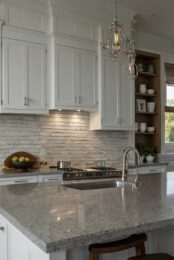
Source: Pinterest/860539441338359402/
Black and white
The contrast between black and white quartz countertops adds a bold and striking element to your kitchen. This combination is perfect for modern and minimalist designs, creating a visually appealing and balanced space.
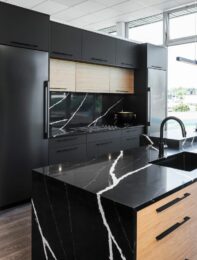
Source: Pinterest/954974295977725824/
Beige and brown
For a warm and inviting kitchen atmosphere, consider combining beige or brown quartz countertops with complementary cabinetry and decor. This colour scheme adds a cosy and earthy feel to your kitchen, making it a welcoming space for family and guests.
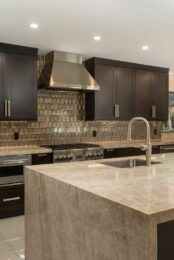
Source: Pinterest/397442735876099166/
Blue and white
Blue quartz countertops paired with white cabinetry create a refreshing and coastal-inspired kitchen design. This combination adds a pop of colour and a sense of tranquillity to the space, making it perfect for beach-themed or nautical kitchens.
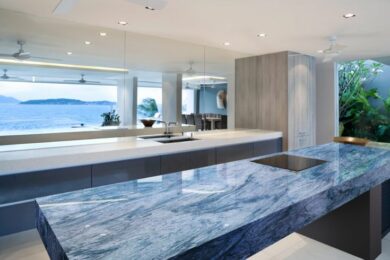
Source: Pinterest/355784439330856387/
Green and white
Green quartz countertops with white accents bring a touch of nature into your kitchen. This combination is ideal for creating a fresh and vibrant atmosphere, adding a unique and lively element to your kitchen design.
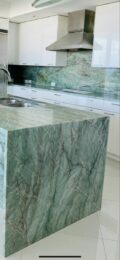
Source: Pinterest/4362930882492472/
Maintenance tips
Daily cleaning
Wipe down your quartz countertops daily using a mild soap or a gentle, non-abrasive cleaner and a soft cloth or sponge. Steer clear of harsh chemicals and abrasive pads, as they may harm the surface.
Preventing stains
Although quartz is stain-resistant, it’s still important to clean up spills promptly. Avoid leaving acidic or highly pigmented substances, such as red wine, coffee, or vinegar, on the surface for extended periods.
Avoiding heat damage
Quartz countertops are heat-resistant but not heat-proof. Always use trivets or hot pads under hot pots, pans and appliances to prevent thermal shock and potential damage to the surface.
Preventing scratches
While quartz is highly durable, it’s still possible to scratch the surface with sharp objects. Use cutting boards when preparing food and avoid dragging heavy or rough items across the countertop.
Regular sealing
Unlike natural stone countertops, quartz does not require regular sealing. However, it’s a good idea to follow the manufacturer’s recommendations for any specific care instructions or products to use.
Important considerations
Budget
Quartz countertops can vary in price depending on the brand, design and thickness. Determine your budget beforehand and explore different options within your price range.
Style and design
Consider the overall style and design of your kitchen. Choose a quartz countertop that complements your cabinetry, flooring and decor to achieve a cohesive and harmonious look.
Durability
Quartz is known for its durability, but it’s essential to choose a high-quality product from a reputable manufacturer. Look for warranties and certifications to ensure you’re getting a reliable and long-lasting countertop.
Installation
Professional installation is crucial for ensuring the longevity and performance of your quartz countertops. Hire experienced installers who have expertise in working with quartz to achieve a flawless finish.
Environmental impact
Some quartz manufacturers prioritise sustainability and environmentally friendly practices. Research brands that use recycled materials and eco-friendly production methods if environmental impact is a concern for you.
Quartz kitchen countertops offer a perfect blend of aesthetics, durability and low maintenance, making them an excellent choice for modern kitchens. With a wide range of design options and colour combinations, you can create a kitchen that reflects your personal style while enjoying the practical benefits of quartz. By following the maintenance tips and considering important factors, you can ensure your quartz countertops remain a beautiful and functional centrepiece in your kitchen for years to come.
FAQs
Are quartz countertops stain-resistant?
Yes, quartz countertops are highly stain-resistant due to their non-porous surface. However, it's still important to clean up spills promptly to prevent any potential staining.
Can I place hot pots directly on quartz countertops?
While quartz is heat-resistant, it's recommended to use trivets or hot pads under hot pots and pans to prevent thermal shock and potential damage to the surface.
Do quartz countertops require sealing?
No, quartz countertops do not require regular sealing like natural stone countertops. Their non-porous surface makes them highly resistant to stains and bacteria.
How do I clean quartz countertops?
Clean quartz countertops daily with a mild soap or a gentle, non-abrasive cleaner and a soft cloth or sponge. Avoid using harsh chemicals or abrasive pads.
Can quartz countertops be used in outdoor kitchens?
While quartz countertops are durable, they are not recommended for outdoor use as prolonged exposure to UV rays can cause discolouration and damage.
Are there eco-friendly quartz countertop options?
Yes, some quartz manufacturers prioritise sustainability and use recycled materials and eco-friendly production methods. Research brands that align with your environmental values.
How do I prevent scratches on quartz countertops?
To prevent scratches, use cutting boards when preparing food and avoid dragging heavy or rough items across the countertop. While quartz is durable, sharp objects can still cause damage.
| Got any questions or point of view on our article? We would love to hear from you. Write to our Editor-in-Chief Jhumur Ghosh at jhumur.ghosh1@housing.com |







